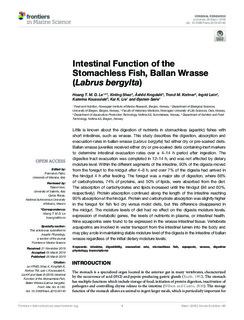Intestinal function of the stomachless fish, ballan wrasse (Labrus bergylta)
Le, Hoang Thi My Dung; Shao, Xinting; Krogdahl, Åshild; Kortner, Trond Moxness; Lein, Ingrid; Kousoulaki, Katerina; Lie, Kai Kristoffer; Sæle, Øystein
Journal article, Peer reviewed
Published version
Permanent lenke
http://hdl.handle.net/11250/2636769Utgivelsesdato
2019Metadata
Vis full innførselSamlinger
- Articles [3011]
- Publikasjoner fra CRIStin [3061]
Sammendrag
Little is known about the digestion of nutrients in stomachless (agastric) fishes with short intestines, such as wrasse. This study describes the digestion, absorption and evacuation rates in ballan wrasse (Labrus bergylta) fed either dry or pre-soaked diets. Ballan wrasse juveniles received either dry or pre-soaked diets containing inert markers to determine intestinal evacuation rates over a 4–14 h period after ingestion. The digestive tract evacuation was completed in 12–14 h, and was not affected by dietary moisture level. Within the different segments of the intestine, 90% of the digesta moved from the foregut to the midgut after 4–8 h, and over 7% of the digesta had arrived in the hindgut 4 h after feeding. The foregut was a major site of digestion, where 86% of carbohydrates, 74% of proteins, and 50% of lipids, were absorbed from the diet. The absorption of carbohydrates and lipids increased until the hindgut (98 and 80%, respectively). Protein absorption continued along the length of the intestine reaching 90% absorption at the hindgut. Protein and carbohydrate absorption was slightly higher in the foregut for fish fed dry versus moist diets, but this difference disappeared in the midgut. The moisture levels of diet had no effect on the digesta moisture levels, expression of metabolic genes, the levels of nutrients in plasma, or intestinal health. Nine aquaporins were found to be expressed in the wrasse intestinal tissue. Vertebrate aquaporins are involved in water transport from the intestinal lumen into the body and may play a role in maintaining stable moisture level of the digesta in the intestine of ballan wrasse regardless of the initial dietary moisture levels.
